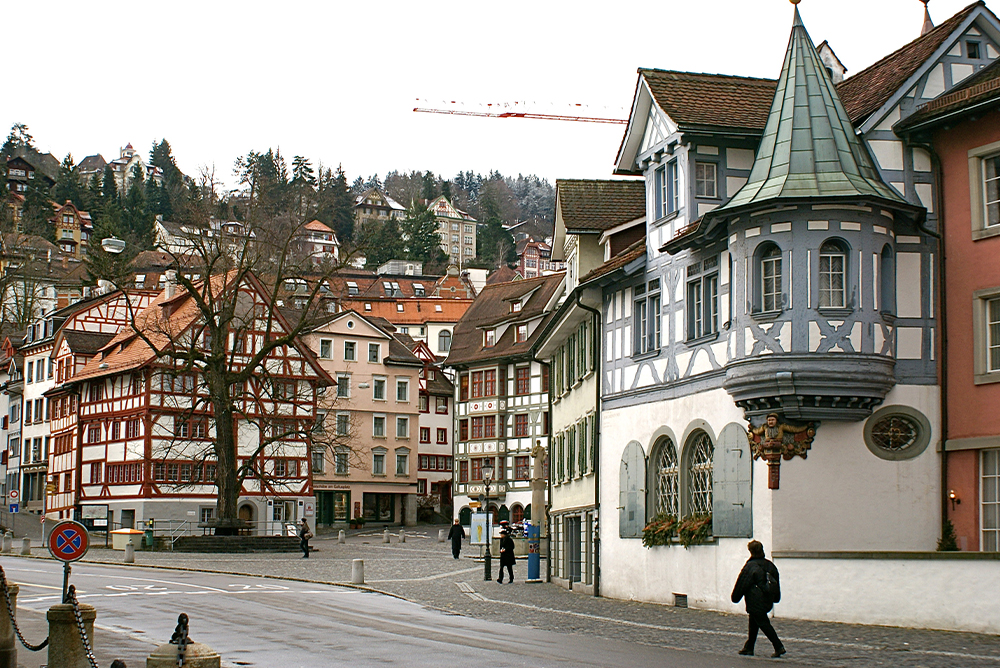
The people’s veto dates back to the Canton of St. Gallen, pictured above. Political economist Stephan Kyburz shares how this democratic tool evolved into the modern referendum. Courtesy of Hellebardius/Flickr (CC BY-NC-SA 2.0).
What are the obstacles and opportunities facing democracy today? Zócalo is publishing a series of letters to highlight how the world’s democratic ideals are faring in practice. From Switzerland: Political economist Stephan Kyburz shares how the “people’s veto” and the inclusive consultation process that it has inspired make for potent citizen-led politics.
Switzerland’s direct democracy is powerful and well-known. But there are two pieces of it that I think are too obscure: the referendum, or “people’s veto,” and the inclusive consultation process that it has inspired over time.
Here, on the national and local levels, citizens can collect signatures and qualify a referendum to reject a law passed by a legislature. Our experience is that this check on lawmaking actually makes parliaments more thoughtful and considerate when drafting a law.
The people’s veto, the predecessor of the modern referendum, dates to 1831, when the Canton of St. Gallen adopted a new constitution that introduced the first legal referendum that allowed male citizens to reject a law that already had been approved by the cantonal parliament. The idea was to forge a compromise between advocates of representative democracy and supporters of direct democracy, who threatened to abandon the constitutional assembly if direct democracy was not included in the constitution.
Under that first people’s veto, 50 citizens of any municipality in the canton had 45 days after a law or a treaty was passed by parliament to request the convening of a municipal assembly (similar to a town hall meeting) to deliberate on whether there should be a people’s veto against that law.
In the assembly, members would vote to figure out whether the citizens were in favor or against the law. Absent citizens were counted as against the law.
It was not easy to reject a law in this manner—in part because in municipalities where there had been no veto position, all citizens were counted as being in favor of it. Finally, all votes for and against the proposed law were added up to the cantonal level to find out whether the people’s veto was successful. Still, despite the high bar, municipalities in St. Gallen used the people’s veto frequently, and many other cantons subsequently implemented the procedure.
The new tool evolved into the modern referendum we now know, and often use. The referendum was first introduced in the Canton of Vaud in 1845 and then in the Canton of Grisons in 1854. Different versions of referendums followed in the various cantons. Most cantons hence moved from a purely representative democracy to a semi-direct democracy (a mix of representative and direct democracy). In fact, in the 1870s, only three cantons remained pure representative systems.
Today’s referendum does not rely on citizens in any municipality to request an assembly and vote on a proposed law; instead, it involves collecting signatures. If opponents of a law succeed in collecting enough citizens’ signatures within a certain period of time, the proposed law will be accepted or rejected by a simple majority popular vote.
Today Switzerland’s national constitution requires every canton to have a legal referendum procedure. Besides legal referendums, many cantons also employ the financial referendum, which requires voter approval for large state expenditures. Lawmakers first introduced a national legal referendum in 1874, allowing male citizens (Swiss women didn’t gain voting rights on the national level until 1971) to vote via simple majority to reject federal laws, too.
Why is the legal referendum such an important democratic institution? Because it completely changes the political process of crafting and negotiating laws. The most important aspect of the people’s veto right is its indirect effect on the work of parliament. Knowing that citizens may reject a law that doesn’t meet expectations, parliament works to find large majorities—to make the law acceptable to all major parties and interest groups. If one of the larger parties in parliament rejects a proposed law, that party is likely to have the political power and financial means to collect the 50,000 signatures in 100 days that is required to call for a popular decision on the matter.
This brings me back to Switzerland’s consultation procedure, or Vernehmlassungsverfahren, which emerged because of the pressure that a possible referendum puts on lawmakers.
First installed in 1874, the consultation is a preparatory step in the writing of laws and allows the government and parliament to receive feedback and check the chances of passing and implementing any proposed law. Cantons, political parties, economic associations, trade unions, municipalities, and cities are invited to provide assessments on a proposed law. In fact, anybody who wants to provide feedback on a proposed law can do so.
The consultation procedure checks a law on its accuracy, enforceability, and acceptability. Implicitly, the consultation tries to encourage political parties and interest groups to register their problems with a law during its drafting, instead of waiting for a referendum after.
Consultation is a Swiss answer to a global problem. Around the world, many people feel parliaments are disconnected from constituents, and that politicians pursue their own agendas once elected. Citizens feel powerless to influence the legislative process, and thus rarely follow discussions in parliament. The only way to disagree with politicians is to not re-elect them. There’s no avenue to engage with lawmaking as it happens.
The legal referendum brings accountability back to the legislative process and reconnects citizens with politicians, via processes like Switzerland’s consultation system. Politicians become the agents of the citizens. The citizens become the real sovereign of democracy.




Send A Letter To the Editors